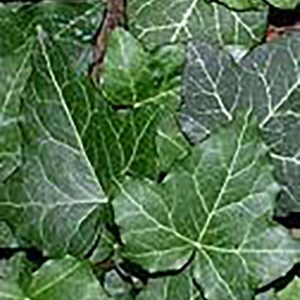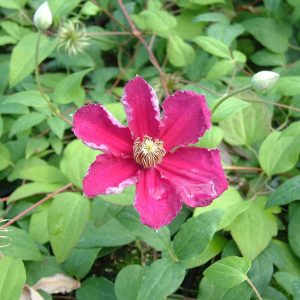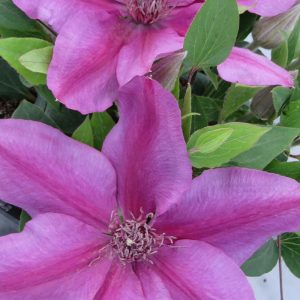Description
Clematis is a genus of beautiful and popular climbing vines that are native to many parts of the world, including Europe, North America, and Asia. These plants are prized for their showy, often fragrant flowers that range in colour from white to pink, red, purple, and blue. Clematis can be trained to climb up trellises, walls, and fences, and can also be grown as a ground cover. The flowers of clematis are typically quite large, with many cultivars boasting flower diameters of up to 20cm. These plants are available in a wide range of varieties, with different growth habits, flower types, and blooming seasons. Clematis requires well-draining soil and prefers full sun to partial shade, depending on the cultivar. With proper care and pruning, clematis can be a long-lived and beautiful addition to any UK garden.
Key Facts
- Common Name(s):Clematis ‘Huldine’
- Hardiness:Fully hardy
- How big will I get? Clematis ‘Huldine’ can grow to a height of 3m and a spread of 2m.
- Did You Know That:There are Spring, Summer, Autumn and Winter flowering varieties of Clematis.
Plant Calendar
A rough guide to how this plant will change through the year.
| Jan | Feb | Mar | Apr | May | June | July | Aug | Sept | Oct | Nov | Dec | |
| Flowering Time | 
| 
| ||||||||||
| Foliage Colour |  |
 |
 |
 |
 |
 |
 |
 |
 |
| J | F | M | A | M | J | J | A | S | O | N | D |

| 
| ||||||||||
 |
 |
 |
 |
 |
 |
 |
 |
 |
Care Guide

Soil Requirements
Clematis ‘Huldine’ prefers soil with good drainage and does not tolerate standing water. This plant can grow in soil with a wide range of pH levels, it is not picky about the pH level of the soil.

Best Position
Clematis ‘Huldine’ can handle either an exposed or a sheltered position and can cope with either full sun or partial shade.

Maintenance
Clematis ‘Huldine’is a late flowering Clematis which blooms on growth produced that growing season, so are best to be pruned in early Spring as this gives them plenty of time to produce lots of growth which will eventually lead to lots of flowers. If pruning is neglected the flowers will appear higher and higher on the plant over time. They should be pruned back to the lowest sideshoots from the base.

Pest, Diseases and Wildlife
Clematis ‘Huldine’ can have problems with aphids and caterpillars, and it tends not to have problems with diseases. It is not considered to be toxic.





